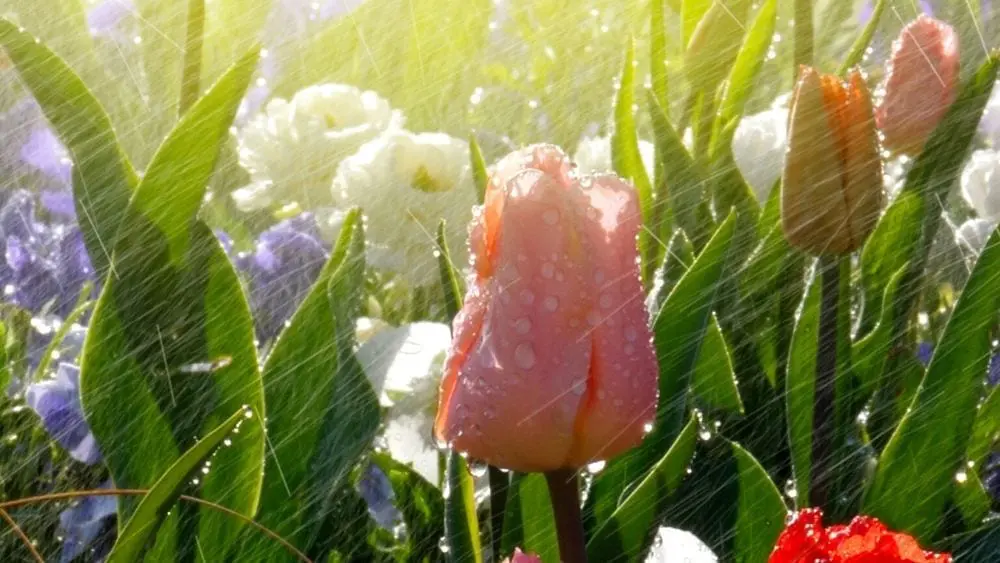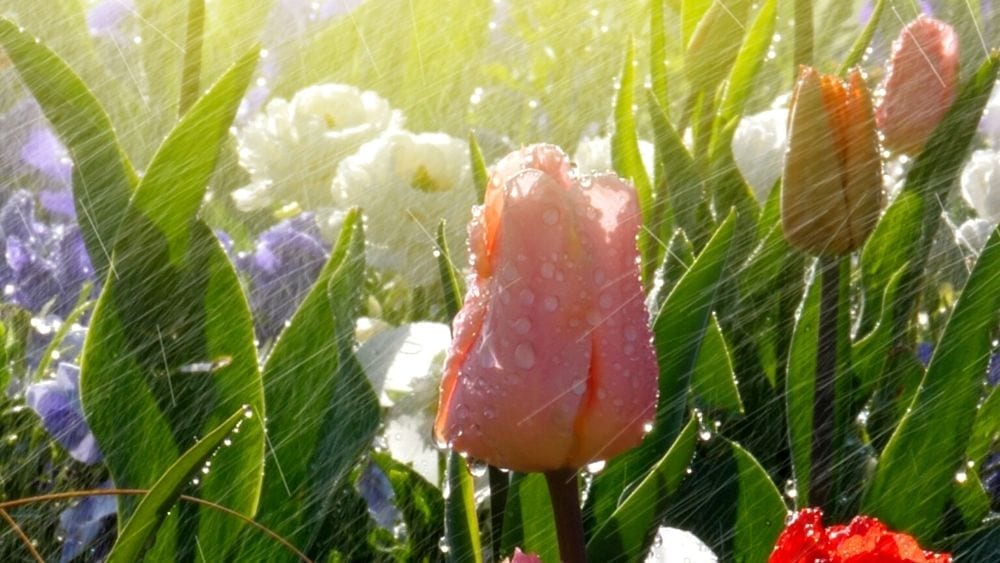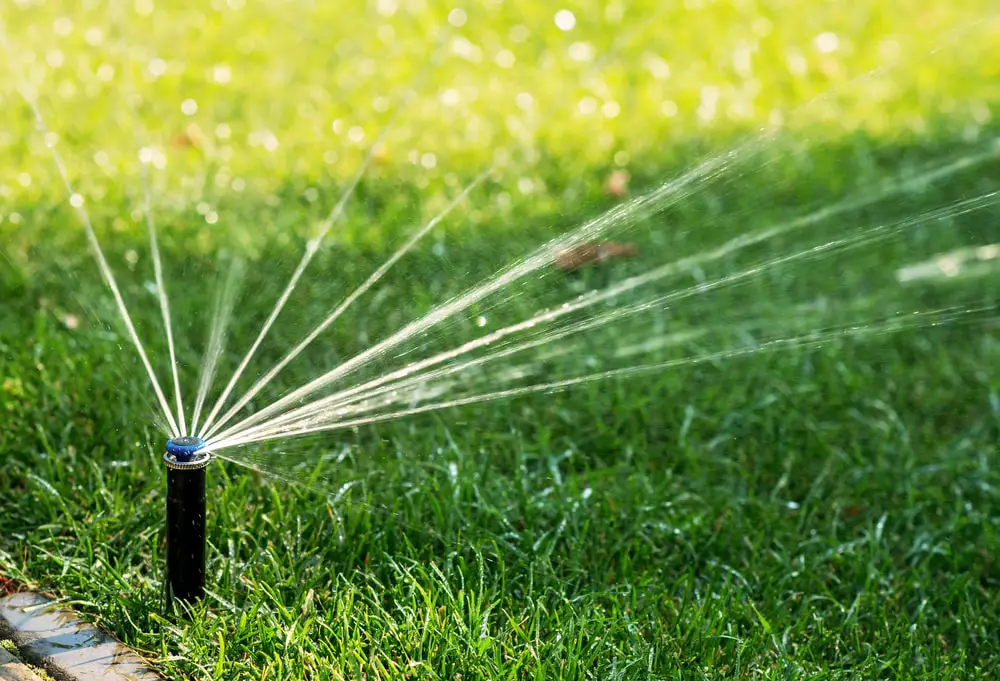Proper lawn care is essential not only for the aesthetic appeal of your home but also for the overall health and wellbeing of your yard’s ecosystem. A well-maintained lawn requires consistent and adequate watering, which can be a demanding task, especially during dry periods. Lawn irrigation sprinkler systems offer a solution to this predicament by automating the watering process, ensuring that your lawn and garden receive the exact amount of water they need, exactly when they need it. But, is this convenience worth the investment? Let’s delve into the pros and cons to help you make an informed decision.

- Automated sprinkler system in action, ensuring consistent and targeted watering for a vibrant garden. Source: @newhomesource – newhomesource.com
The first major benefit of installing a lawn irrigation sprinkler system is the boon to lawn and garden health. Consistent, targeted watering ensures your green spaces get just the right amount of hydration without the guesswork or inconsistency of manual watering. This can lead to a lush, vibrant lawn and flourishing garden beds, as over or under-watering is largely eliminated. Furthermore, the health of your lawn directly contributes to a more robust local ecosystem, sheltering and feeding a wide range of beneficial insects and wildlife.
- <img src=”https://temeculavalleyspotlight.com/wp-content/uploads/sites/270/2024/06/665f57cd67163.webp” alt=”A landscaper performing maintenance on a lawn irrigation system, illustrating the hands-on work and potential repair costs.” data-type=”search”>
- A landscaper performing maintenance on a lawn irrigation system, illustrating the hands-on work and potential repair costs. Source: groundsguys.com
The convenience and time-saving benefits of an automated system cannot be overstated. With schedules that are increasingly packed, finding time to manually water can be a challenge. Lawn irrigation systems take care of this chore for you, freeing up valuable time. Additionally, these systems can be programmed to water at the optimal time of day to reduce evaporation loss, further enhancing their efficiency. This not only saves time but can also lead to direct savings on your water bill, making an irrigation system an appealing option for the budget-conscious homeowner.

- Exploring the benefits and drawbacks of investing in a lawn irrigation sprinkler system. Source: @newhomesource – newhomesource.com
Speaking of budget, water conservation is another significant advantage. Irrigation systems can be fine-tuned to dispense the precise amount of water needed by each part of your yard, significantly reducing waste. Moreover, technological advancements in irrigation systems, such as smart controllers and moisture sensors, can adjust watering based on rainfall and soil moisture levels. This not only conserves a precious resource but can also mean lower utility bills over time, offsetting some of the initial investment costs.

- Sprinkler system efficiently watering grass, showcasing the potential for water conservation and lawn health. Source: groundsguys.com
An often overlooked advantage is the potential increase in property value and curb appeal that a well-maintained landscape can bring. Homes with lush, healthy lawns and gardens tend to sell for more and attract buyers more quickly. Thus, the installation of a lawn irrigation system can be seen as an investment not just in the health of your lawn but in the value of your property as a whole.
However, it’s not all sunshine and rainbows. The high initial cost of installing a lawn irrigation system can be prohibitive. This upfront investment can run into thousands of dollars, depending on the size of your yard and the complexity of the system. Additionally, there can be occasional repairs and ongoing maintenance costs to consider. Sprinkler heads need replacing, lines can break, and the system requires winterization in colder climates to prevent damage. These costs add up over time and can make some homeowners hesitant.
Maintenance is another factor that can’t be ignored. To ensure efficiency and prevent issues like over-watering, an irrigation system needs regular checks and adjustments. This includes inspecting sprinkler heads, monitoring for leaks, and adjusting settings based on seasonal changes. While not necessarily difficult, this maintenance requires a certain level of commitment and could potentially offset some of the convenience benefits.
Environmental concerns are also worth considering. Over-reliance on sprinkler systems can lead to overwatering, contributing to runoff that may carry fertilizers and pesticides into local waterways. Additionally, the energy used to run these systems, while generally low, still contributes to your home’s overall environmental footprint. As environmentally conscious homeowners, it’s essential to weigh these factors carefully.
The complexity of planning and installing a system that adequately covers your entire yard without waste or overlap can be daunting. Professional installation is often recommended to avoid common pitfalls, adding to the initial cost. However, a well-designed system, once installed, requires minimal adjustment and can provide years of service.
In conclusion, while the initial costs and ongoing maintenance of lawn irrigation systems can be significant, the benefits they offer in terms of lawn health, convenience, water conservation, and property value are compelling. For busy homeowners, environmentally minded individuals, or those simply looking to enhance their property’s appeal and value, the investment in a lawn irrigation system could be well worth considering. As with any major home improvement project, it’s important to weigh the pros and cons in the context of your personal circumstances, priorities, and lifestyle.
